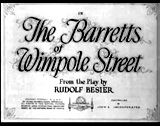
|
The Barretts of Wimpole Street
(1934)
In MGM's and director Sidney A. Franklin's
beautifully-produced, prestige work was an adaptation based from
Rudolf Besier's successful 1930 stage play. The
film was unnecessarily remade in Cinemascopic Metrocolor as The
Barretts of Wimpole Street (1957), awkwardly starring Jennifer
Jones as the only American performer in the British cast:
- the historical,
emotional, soap-operaish heart-felt tale was set in 1845 in London,
at the home of the Barrett family (at 50 Wimpole Street). The household
(of three daughters and six sons) was dominated by the tyrannical,
villainous and dictatorial control of the widowed and patriarchal Edward
Moulton-Barrett (Charles Laughton), who believed that romantic love was sinful
- the only child that he showed any preference
for was his mostly bed-ridden, invalid eldest daughter Elizabeth
Barrett (Norma Shearer), nicknamed "Ba," who
could only manage sitting in a chaise lounge during the day. The
nearly 40 year-old daughter occupied her time by reading and enjoying
her pet cocker spaniel Flush
- she also corresponded with
Victorian literary poet Robert Browning (Fredric March), who came
to her personally after one of her letters to pay a visit. The
charming and handsome poet arrived and they happily discussed poetry,
the arts, philosophy of life, and other engaging subjects: (Browning: "We've
known each other a mere half hour, and yet we've talked intimately
of art and life and death and love")
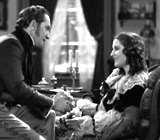 Browning's First Visit to See Elizabeth
Browning's First Visit to See Elizabeth
|
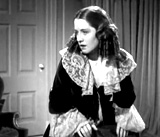
Elizabeth Struggling to Stand and Get to the Window
|
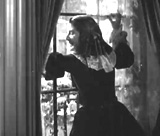
Elizabeth At the Window
|
- although overwhelmed by Browning's immediate ardent
love for her, Elizabeth found herself also falling in love with
Browning, and with newly-found vitality, health and happiness,
was even able to struggle to the window to watch his departure
- her jealous, stern and over-protective father vigilantly
observed the couple, and although he reluctantly allowed further
visits, he strictly forbade Elizabeth from becoming romantically
involved. As Elizabeth's romantic interest in Browning grew, so
did her physical strength and ability to walk; she divulged her love:
"I'd rather die with you beside me than live a hundred lives without
you"
- Mr. Barrett also
possessively ruled over the romantic couplings of his other children,
mostly his youngest daughter Henrietta (Maureen O'Sullivan) and
her military beau Captain Surtees Cook (Ralph Forbes), and brashly
disallowed their illicit relationship (he called it a "filthiness").
He caught her in his company, viciously seized her wrists, forced
her to confess to having sex with Cook, and harshly made her swear
on a Bible that if she ever saw him again, he would disown her
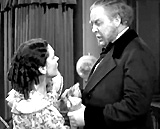
Barrett Violently Seizing Henrietta's Wrists to
Control Her
|
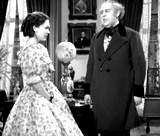
Viciously Forcing Henrietta to Swear on a Bible
to Never See Her Beau Again
|
- Barrett's unreasonable stranglehold grew
even tighter after he dismissed Elizabeth's doctor-recommended therapeutic
retreat to the warmer climate of Italy, and threatened to have the
family move to the countryside of Surrey to further curtail Browning's
visits
- to protest her devoted father's crushing control
("You're like a shadow over our lives"), Elizabeth sent word to
Browning that she would meet him and runaway together. He responded
that he wanted to marry her that very evening
- to dissuade his disobedient
eldest daughter after she denounced him, the
abusive and obsessed Barrett claimed that only Elizabeth, out of
all of his children, was conceived in love (not hateful rape),
and insinuated that he had more than a fatherly love for her; he
confessed that he wanted her all for himself: ("Nothing and no
one can come between us, my child, my darling! You want me to be
happy. The only happiness I shall ever know is all yours to give
or take. You must look up to me and depend on me and lean on me.
You must share your thoughts with me, your hopes, your fears, your
prayers..."). [Note: The morals code of the 1930s tamped down
the implications of his unnatural and incestuous interest in her,
but allowed his admission that he exhibited "dragon" behavior.]
- repulsed by his clingy, perverse sexual advances,
Elizabeth decided to leave immediately to meet
up and elope with Browning, get married, and move with him to Italy:
("He can't stop me. I don't belong to him anymore. He could kill
me, but he can't stop me....I must go. To Robert....Until today,
I've never really known my father. I've even hoped I might confide
in him, but now I know it would be hopeless. He'd crush me as he
crushed my mother.... He's cruel - cruel and pitiless and I'm afraid");
she left a note for her father that she was leaving to be married,
before taking one last look around with her dog Flush in her arms
before departing
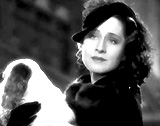
Elizabeth's One Last Look Before Departing from Her Home with Her
Dog Flush in Her Arms
|
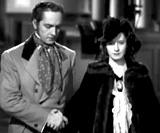
Final Scene: Elizabeth's Marriage to Robert Browning
|
- in the final scene, they were married, and
would go on to live in Italy, and become two of England's most beloved
poets, writing sonnets and poems
|
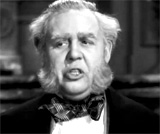
Controlling, Widowed Patriarch
Mr. Edward Moulton-Barrett (Charles Laughton)
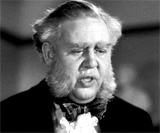
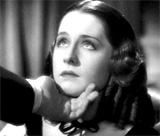
Elizabeth (Norma Shearer) Under Her Father's Tyrannical
Control
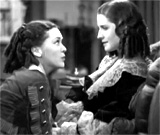
(l to r): Younger Sister Henrietta (Maureen O'Sullivan) Speaking to Elizabeth
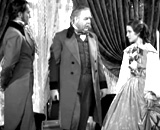
Mr. Barrett Intervening in Elizabeth's Love Affair with
Browning
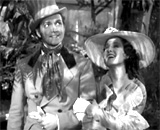
The Romantic Couple
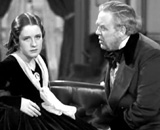
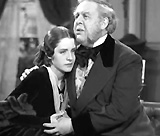
Barrett's Final Dramatic Confessional Scene with Elizabeth
|









